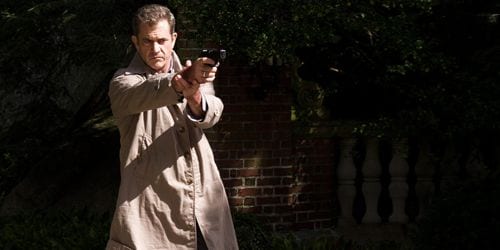
Tommy Craven (Mel Gibson) is mad. You know because he furrows his brow, stares into space, slams bad guys through walls, and shoots at oncoming cars without even thinking of ducking. Tommy’s mad, you know from the start of Edge of Darkness, because his daughter — whom he loves urgently and hugely, even if he hasn’t exactly spent time with her recently — is dead. And not just dead, but shot dead, dying quite literally in his arms.
So, Tommy’s madness is righteous as well as all-consuming and increasingly aggressive. Tommy’s madness is also of a piece with Gibson’s most iconic roles, when he loses someone he loves — in the Mad Max movies, Lethal Weapons, The Patriot, Payback, or Braveheart — and seeks solace in smashing villains’ faces. The film toys briefly with the possibility that the daughter, Emma (Bojana Novakovic), is a victim of her dad’s enemies, seeing as he a longtime Boston cop. When the shooter snarls “Craven!” as he fires, underscoring the name’s odiousness, he and his cop buddies assume she’s been shot by accident, an assumption that fuels all sorts of rage and vengeance fantasies to be enacted on someone already in Tommy’s file.
When this avenue of investigation doesn’t pan out, when it becomes clear that Emma was assassinated by her own very bad guy, Tommy goes the more full-on brutal route. Her murder demands retribution, and he is, as he pronounces early on, “the guy that has nothing to lose.” Just like those other self-sacrificing, self-asserting apotheoses of fury Gibson has played previously, Tommy has passion to burn, whether in close-up grimaces or fractured, blaringly loud fight scenes. One of these accelerates his introduction to Emma’s boyfriend David (Shawn Roberts), who greets him at the door with a hunting knife, which Tommy correctly interprets as a sign that his daughter is not to the only individual in danger from her shadowy drive-by executioner.
That David is not only distrusting and touchy but also given to Tourette’s-ish deployments of fuck as noun, verb, and adjective, all in one sentence, suggests that he’s got issues Tommy won’t be able to solve. Though Tommy allows that he must be okay because Emma liked him, the kid is plainly too sweaty and too hollow-eyed to live, and so the information and emotional context he provides are limited. Tommy presses on, seeking his next source, and also his next attacker — lucky for all of us that he runs into Darius Jedburgh (Ray Winstone), or rather, Jedburgh runs into him, appearing somewhat mysteriously in Tommy’s backyard in order to suss out just how much he knows, and so decide whether he must also die.
These guys share a decisive hard-ass rhythm, each appreciating the other’s pragmatic approach to violence and vengeance. They also share a distinctive patter: Jedburgh is a fixer — for corporations and government agencies, but he disdains the men he works for even more than those he’s assigned to kill. “I’ve made things unintelligible for the past 30 years,” he sighs, proud of his superior intelligence and fond of his fine wines, but also weary of the silly jockeying for power and always-a-step-behind cover-ups. That he’s working at this point, sort of, for both the CIA and a client company making secret nuclear weapons (under cover of a “safe and clean nuclear energy source”), irks Jedburgh immensely. The men ordering hits (Danny Huston, as an executive named Jack, among them) are incorrigibly short-sighted, weak-minded, and crass.
In comparison, Tommy’s muscle-headedness looks almost admirable. At least he breaks the rules that should be broken and enjoys wreaking havoc in the name of moral order. (During Tommy’s own meeting with Jack, the villain offers his condolences over Emma, then asks, “How does it feel?” You can almost see Tommy filing that line away for later use.) It helps that Jedburgh and Tommy — unlike their employers and nemeses — state their mutual approvals somewhat cleverly. When Tommy asserts that he’s “not gonna arrest anyone,” Jedburgh nods, “I never do.” Jedburgh laments feeling like Diogenes, in search of an honest man (yes, that would be Tommy), and warns him that connecting A to B will be hard because “I’m usually the guy that stops you connecting A to B.”
Much of the film, directed by Martin Campbell and condensed/adapted from his six-hour 1985 British TV miniseries, invites you to appreciate Jedburgh and Tommy’s appreciation. Aside from the banter, Tommy engages in or witnesses some stunningly brutal assaults and murders, by guns, cars, and completely deranged bodies. These spurty and highly entertaining scenes recall the Final Destination model of shock-barbarity, not unexpected, exactly, but coming fast and without obvious preparation, in a way that seems artful, or at least gut-effective. Tommy is excellent in these moments, his grasp of the stakes instant and accurate, his decisions lethal. It helps that his grim, weathered face lays out all those bad roads he’s traveled and that his utter calm and calculation remind you of the olden-days Mel Gibson, when he was pretty and his roles reflected a world beyond his own (see: the Road Warrior gazing on a burned carcass and not reacting even a little bit).
These violent scenes also serve as something of a counterweight to the movie’s grindingly sentimental business, Tommy’s conversations with an off-screen Emma (“Don’t cry, dad.” “I’m not”) and his interactions with an eight-year-old version (a flashback where she mirrors her dad’s morning shaving is awfully cute, and stands out for its intimacy and seeming ingenuousness; other similar scenes are exponentially less effective and poorly scripted, and all of them make you wonder where her mother was). As these father-daughter moments remind you of the motivation for Tommy’s mayhem. But the motivation is beside the point. He’s Mel Gibson and he’s mad. That’s all that matters.

![Call for Papers: All Things Reconsidered [MUSIC] May-August 2024](https://www.popmatters.com/wp-content/uploads/2024/04/all-things-reconsidered-call-music-may-2024-720x380.jpg)



